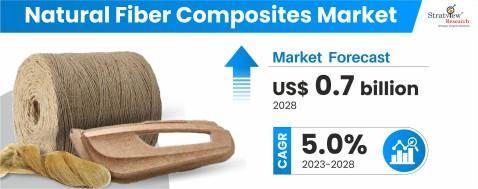Natural Fiber Composites: Driving Sustainability in Manufacturing

In a world increasingly focused on sustainability, natural fiber composites (NFCs) have emerged as an innovative solution to reduce reliance on petroleum-based materials. Made from renewable resources like hemp, flax, jute, and sisal, these composites are gaining traction in a wide range of industries, from automotive and construction to packaging and consumer goods.
According to Stratview Research, the natural fiber composites market is likely to grow at a healthy CAGR of 5.0% during 2023-2028 to reach USD 0.7 billion valuation in 2028. This growth is driven by increasing demand for eco-friendly materials and the shift toward sustainable production practices.
Download your free sample now, to identify key growth opportunities in natural fiber composites market:
https://stratviewresearch.com/Request-Sample/3582/natural-fiber-composites-market.html#form
What Are Natural Fiber Composites?
Natural fiber composites are materials made by embedding natural fibers into polymer matrices, creating a composite material that offers the benefits of both the fibers and the polymers. The natural fibers provide strength and durability, while the polymers bind the fibers together to create a solid structure. These composites offer several advantages over traditional petroleum-based plastics, including:
- Environmental Sustainability: Natural fibers are biodegradable and derived from renewable sources, making NFCs a more eco-friendly alternative to synthetic composites. This aligns with growing regulatory pressures and consumer demand for sustainable products.
- Lightweight and High Strength: NFCs are lightweight yet strong, offering excellent strength-to-weight ratios. This makes them ideal for applications in industries like automotive, where reducing weight is key to improving fuel efficiency and reducing carbon footprints.
Market Drivers
- Growing Demand for Eco-Friendly Materials: As industries and consumers become more environmentally conscious, the demand for sustainable materials is increasing. NFCs, being made from renewable resources, are seen as a key solution to reduce the environmental impact of manufacturing.
- Automotive Industry Push for Lightweight Materials: The automotive industry is one of the largest consumers of NFCs. Manufacturers are using natural fiber composites in vehicle interiors, door panels, dashboards, and other non-structural components to reduce weight and improve fuel efficiency.
- Construction and Consumer Goods: NFCs are also finding applications in the construction industry for insulation materials and as sustainable alternatives to traditional plastics in consumer goods such as furniture and packaging.
Challenges in the Natural Fiber Composites Market
- Durability and Moisture Sensitivity: While natural fibers offer strength and lightness, they can be sensitive to moisture and environmental factors, which can affect the durability of NFCs. Ongoing research is focused on developing better treatments and protective coatings to enhance the longevity of NFCs.
- Cost Competitiveness: Although natural fibers are often more affordable than synthetic alternatives, the cost of manufacturing NFCs can still be higher than traditional plastics. This can be a barrier to widespread adoption, particularly in cost-sensitive industries.
Conclusion
The Natural Fiber Composites Market is on the rise, driven by sustainability trends and the need for environmentally friendly materials. As technological advancements improve the performance and cost-efficiency of NFCs, their use in industries like automotive, construction, and packaging will continue to expand, paving the way for a more sustainable future.
- Art
- Causes
- Crafts
- Dance
- Drinks
- Film
- Fitness
- Food
- Games
- Gardening
- Health
- Home
- Literature
- Music
- Networking
- Other
- Party
- Religion
- Shopping
- Sports
- Theater
- Wellness


